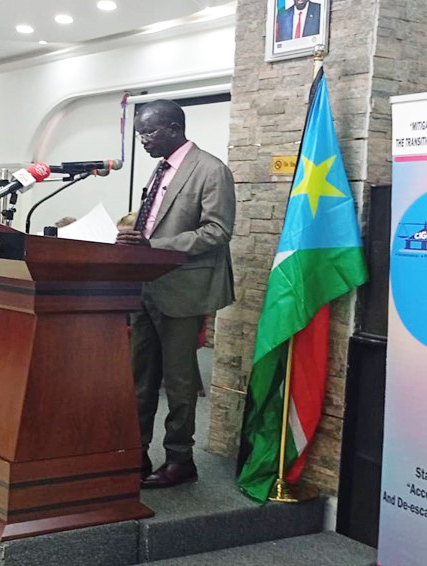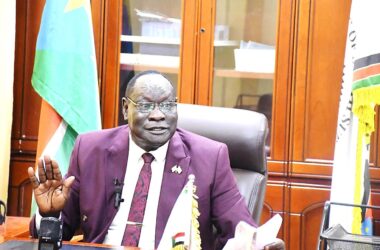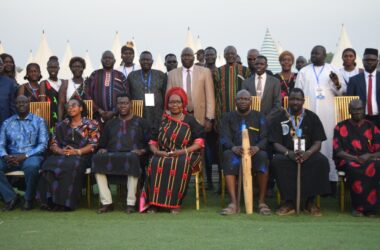By Alan Clement
With 57 weeks left until South Sudan’s December 22, 2026 national election, civil society leaders and UN officials warned that the fragile transition faces mounting threats.
They cited rising violence across states, deepening political mistrust, and unresolved legal and logistical gaps flagged by the National Elections Commission (NEC), all of which risk undermining the credibility of the electoral process.
“We are 57 weeks away from the 22nd of December, 2026 yet we are behind in nearly every pillar of the transition,” South Sudan Civil Society Forum chairperson Galdino Ohoma Ojok told a packed stakeholders’ dialogue in Juba.
“Security arrangements, constitutional development, political dialogue, civic space, electoral preparedness to mention a few. If elections cannot credibly or safely be held, what urgent measures must we adopt today to avoid another painful and costly extension?” he stressed.
Ohoma’s warning came as violence continues to escalate across the country including recent clashes Nasir, Tonj, Tombura, Unity and Upper Nile regions, displacing families and disrupting humanitarian operations.
Human Rights Watch and other monitors have documented major clashes and displacement in Nasir and along Upper Nile’s conflict corridor this year, developments that threaten voter registration, polling security and basic access.
The United Nations Mission in South Sudan (UNMISS) echoed the urgency.
“Too often South Sudan is heard about in the context of conflict. Wouldn’t it be a lovely story if that’s reversed and people can start talking about South Sudan in the context of peace?” said Guy Bennett, UNMISS Chief Political Affairs.
“We will support you where we can,” he added, warning that violence tracked recently in Torit and other hotspots “is not the solution” and that dialogue must drive the next steps.
Compounding the deteriorating security environment are warnings from the NEC itself.
In a recent consultative meetings, the Commission raised concerns about unresolved legal contradictions, outdated census and boundary data, and outstanding electoral laws that could stall preparation for the 2026 poll.
Local reporting in the One Citizen newspaper highlighted NEC advisories that these gaps pose “serious risks” to credibility and could “derail South Sudan’s 2026 elections” without rapid intervention.
South Sudan has not updated its population or constituency data since independence-era exercises, leaving voter roll development and constituency delimitation vulnerable to disputes, political manipulation or regional exclusion.
Forum participants also tied electoral risk to deeper political weaknesses: persistent breaches of the Revitalised Peace Agreement (R-ARCSS), slow implementation of reforms, and a severe trust deficit among signatories.
RJMEC: the body tasked with monitoring the agreement noted that the transition represented by Esther Kyowalabye has already been extended twice and that critical provisions including unified forces, judicial reforms, constitution-making and public finance reforms remain far behind schedule, casting doubt on the feasibility of meeting the December 2026 deadline.
Economic pressures further complicate the outlook. Shut-down oil pipelines, hyperinflation and reduced humanitarian funding have strained government capacity to finance both security stabilization and election logistics.
Displacement and resource scarcity are deepening, affecting communities whose participation in the vote is already uncertain.
Across the speeches, participants called for rapid political consensus, renewed commitment to the agreement, and urgent clarity on the NEC’s outstanding legal and administrative requirements.
They urged accelerated security deployment to hotspots, expanded civic space, and deliberate inclusion of women, youth, and displaced populations in all preparations.
“Let this dialogue produce not only resolutions, but concrete measurable actions,” Ohoma said.
“The people of South Sudan are watching. They are waiting,” he added.
International actors including the AU, IGAD, UN Security Council and major diplomatic missions have repeatedly stressed that inclusive dialogue and full implementation of R-ARCSS remain the only pathway to credible elections.
But their support, Bennett reminded participants, “cannot substitute for national ownership.”
With just 57 weeks left, South Sudan faces a stark choice: act quickly to close security, legal and political gaps or risk entering 2026 unprepared, inviting another extension of the transition and further fracturing public trust in the country’s democratic future.



